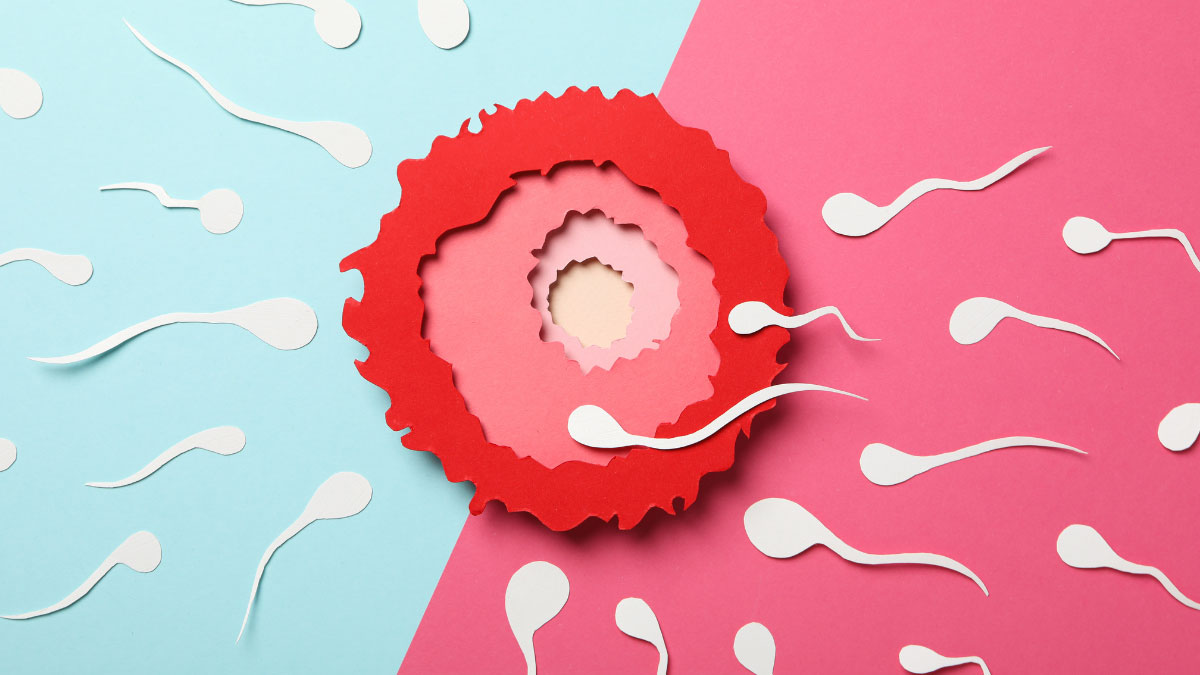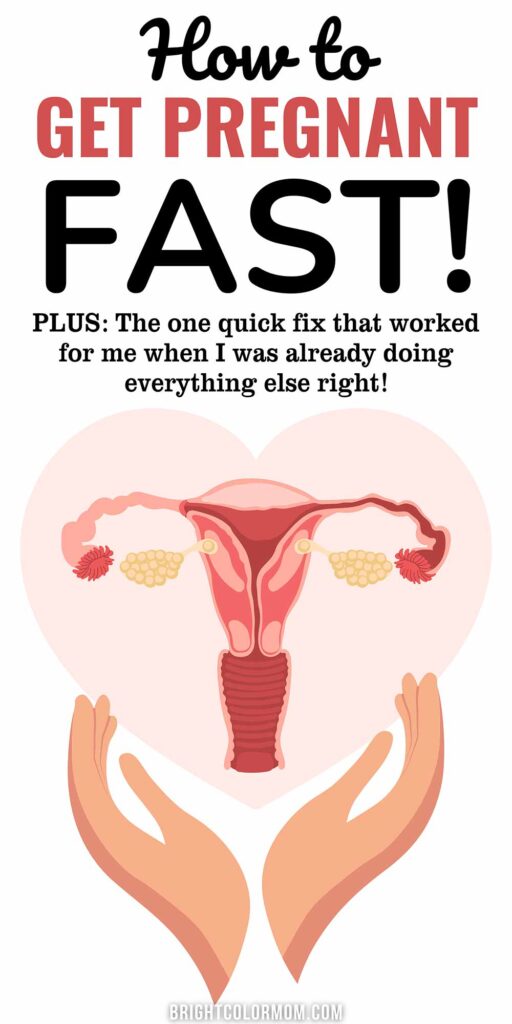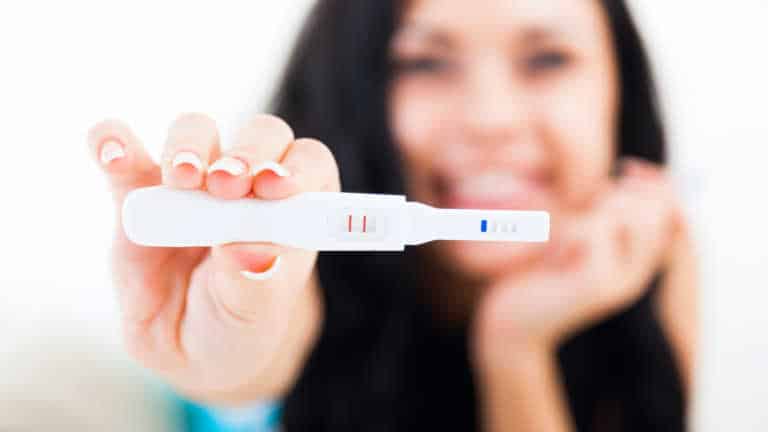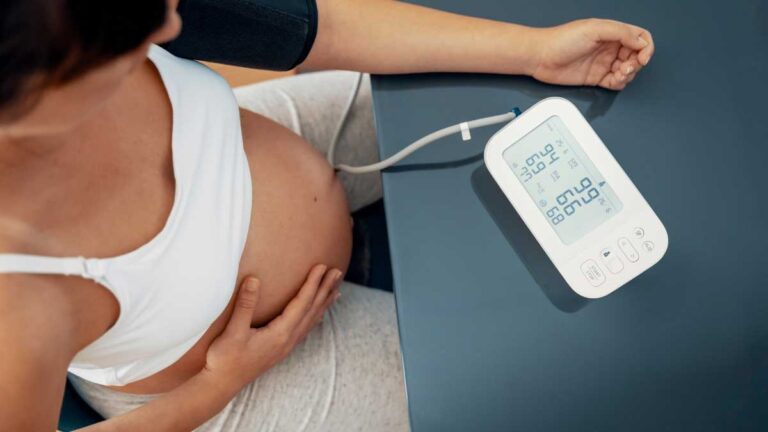Making a tiny human is pretty amazing, but let’s face it: nobody wants to wait forever. Want to know how to get pregnant fast? I got you! This guide will help you optimize your chances of getting pregnant naturally, without turning baby-making into a chore. But before I dive into the nitty-gritty details of everything that goes into fertility, I want to share the one little thing I did that got me pregnant on my very next try.
This post may contain affiliate links. If you make a purchase after clicking one, I may receive a small commission at no cost to you.
OPKs (Ovulation Predictor Kits)
Yep. It was that simple! My husband and I had been trying for our first baby for six months without success, and I was getting impatient. I bought a few packs of OPKs from Dollar Tree, and it turned out that I ovulate super late in my cycle – like only four days before my period! When I FINALLY got a positive on a test, we had sex that very night – and I had a positive pregnancy test seven days later.
Now, that was an incredibly easy fix for me to figure out why I wasn’t conceiving. The same solution may not be what you need, but knowing exactly when you’re ovulating certainly helps! That said, now I’m going to deep-dive into ALL the other factors that can affect your fertility – and how to improve your chances.
This article provides general information and discussions about health and related subjects. The information and other content provided in this article, or any linked materials, are not intended and should not be construed as medical advice, nor is the information a substitute for specific professional medical expertise or treatment.
If you have a medical concern, consult your healthcare provider or seek other professional medical treatment. Never disregard professional medical advice or delay seeking it because of something you’ve read on this website or in any linked materials. If you think you may have a medical emergency, call your doctor or emergency services immediately.
Timing is Key
Think of your cycle as a party for the egg and sperm. You want them to meet during the fertile window, which is roughly 5 days leading up to ovulation and ovulation day itself. (Read pregnancy success stories of women who only had sex two days before ovulation!) There are a few ways to track this.
Period Length
Mark your period on a calendar. Over time, you’ll see a pattern and predict ovulation. By the way: ever wondered if you can get pregnant on your period? I was surprised by the answer!
Temping
Take your temperature first thing each morning. It dips slightly before ovulation and then rises after. Hello, science!
Cervical Mucus
Throughout your cycle, your discharge changes consistency. Around ovulation, it becomes thin and clear, like egg white (sexy, right?).
Period Apps
Tons of cycle tracking apps can help you record all this info and even predict ovulation. More of a pen and paper gal? Get my fertility tracker below!
Maximizing Your Chances
Once you know your fertile window, get busy! Aim for sex every day or every other day during this time. Here are some other tips.
More Sex is Good Sex
Regular ejaculation helps maintain healthy sperm production.
Positions Don’t matter
Forget fancy positions – focus on what feels good for you and your partner. One position is not more effective than another for conception.
Lie Back Afterward
Relax in bed for 10-15 minutes with your legs elevated. It won’t trap sperm like a magical net, but it gives them a fighting chance to reach the fallopian tubes.
Keep Things Lubricated
If dryness is an issue, use sperm-friendly lube. Look for labels like “fertility-friendly” or “sperm-safe.” Pre-Seed is a popular option, designed to mimic natural cervical mucus.
Optimizing Your Fertility
See a Doctor
Schedule a preconception checkup with your partner. This can identify any underlying health conditions either of you have that might affect fertility.
Start Prenatals Now
Start prenatal vitamins before conception. They have folic acid, crucial for preventing birth defects. Plus, they have essential nutrients for both you and your baby during pregnancy. Fun fact: some studies suggest prenatal vitamins with folic acid and zinc can improve sperm quality for men too!
Eat Well
Eat a balanced diet rich in fruits, veggies, and whole grains. Focus on folate-rich leafy greens, lean protein, and healthy fats. Limit processed foods, sugary drinks, and unhealthy fats. Stable blood sugar is key, as both high and low blood sugar can mess with ovulation.
Stay Active
Staying at a healthy weight is good for hormonal balance. Exercise is great, but avoid excessive workouts that can disrupt ovulation.
Stress Less
Chronic stress can affect fertility. Try yoga, meditation, or deep breathing to de-stress.
Get Plenty of Sleep
Aim for 7-8 hours of quality sleep each night. Sleep regulates hormones that play a role in ovulation and fertility.
Consider Acupuncture
Studies suggest acupuncture may improve blood flow to the uterus and regulate ovulation, creating a more baby-friendly environment.
Additional Tips & Considerations
Age Matters
Female fertility declines with age. Talk to your doctor if you’re over 35 and haven’t conceived after 6 months of trying.
Avoid Common Toxins
Limit exposure to environmental toxins like smoking, secondhand smoke, air pollution, and BPA in plastics. Minimize pesticides, herbicides, and even scooping cat poop (which can harbor a parasite that impacts fertility).
Open Communication
Talk to your partner about expectations and concerns. It’s a team effort!
Prioritize Sperm Health
Smoking, excessive alcohol, and tight-fitting underwear can impact sperm health. Consult your doctor about male fertility testing if you’re concerned.
Keep Your Connection
Schedule date nights and prioritize emotional connection with your partner. Remember, you’re making a baby together!
Find a Support System
Trying to conceive can be stressful. Consider joining a support group or talking to a therapist specializing in fertility issues.
Conception Q&A
How long does baby-making usually take?
Most couples conceive naturally within a year, but everyone’s journey is different. Age, health conditions – the usual suspects can affect your timeline.
When should I call a doctor for help?
If you haven’t gotten pregnant after a year of trying (or six months for ladies over 35), chat with your doctor. They can help you troubleshoot and find solutions. There are even fertility treatments like IVF and IUI that can lend a hand.
Are there magic pills to help me get pregnant?
Sort of! Supplements like CoQ10, L-arginine, and maca root might boost egg and sperm health. Talk to your doctor about these options. Read my reviews of the best fertility supplements and best fertility teas available. There are also prescription meds like Clomid, Letrozole, and Gonadotropins that can jumpstart ovulation, but discuss those with your doc first to see if they’re right for you.
What if I have a health condition?
If you have PCOS, endometriosis, or any other pre-existing condition, seeing your doctor is crucial. They can develop a plan to manage your condition and optimize your fertility.
Fertility Resources
Understanding your cycle, taking care of yourself, and having a good support system can all increase your chances of getting pregnant naturally. Remember, everyone’s journey is unique! Be patient, celebrate your efforts, and don’t hesitate to seek professional guidance from your doctor if you have any concerns. This guide is just the beginning! Here are some awesome resources to learn more about fertility, getting ready for pregnancy, and apps for tracking your cycle.
- The American Congress of Obstetricians and Gynecologists (ACOG)
- The National Institute of Child Health and Human Development (NICHD)
- The American Society for Reproductive Medicine (ASRM)
- Glow App
- Clue App
- Fertility Friend App
There are a LOT of other pregnancy apps out there, and many of them include fertility trackers to get you started.
Remember, this information is for educational purposes only and shouldn’t replace professional medical advice. Always talk to your doctor to discuss your individual situation and create a personalized plan for a healthy pregnancy journey.










